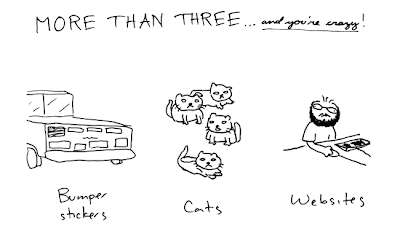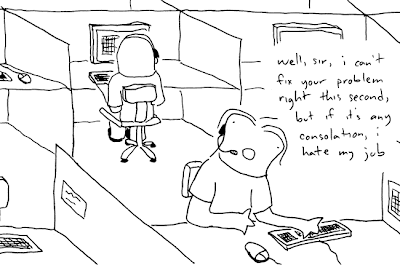I'm bad with saving items in my feed reader "to read later" and then letting months slip by, so it's only now I clicked through to read
Living With Music: a Playlist by Camille Paglia, originally posted to the
NY Times Papercuts blog in July. I've pasted it below in its entirety.
Is the lickin’ stick an antebellum whip or melting phallic candy? Good ol' Camille. I'd know that voice anywhere. Have to admit I adore the Bangles cover of "Hazy Shade of Winter," too.
-----
) Train Kept A-Rollin’, The Yardbirds (1965). An addictive London Mod rave-up epitomizing the accelerating mania of the 1960s, which finally self-destructed. Based on a 1951 song by an African-American musician, Tiny Bradshaw.
2) Ballad of a Thin Man, Bob Dylan (1965). Sinister atmospherics of the garish sexual underground in the repressive pre-Stonewall world. A naive voyeur reporter steps through the looking-glass and may or may not escape.
3) Season of the Witch, Donovan (1966). Nature and society in turmoil, as identity dissolves in the psychedelic ’60s. The witch marks the return of the occult, a pagan subversion of organized religion.
4) 8 Miles High, The Byrds (1966). Shimmering Hindu sitar riffs with jet flight as a metaphor for mental expansion. The song’s ultimate theme isn’t drugs but cosmic consciousness, a now forgotten ’60s goal.
5) Foxy Lady, Jimi Hendrix (1967). Oh, those crazed, strutting, supersonic, wham-bam chords! Their shock on the nerves still excites, more than 40 years later.
6) Lickin’ Stick, James Brown (1968). A deliciously sly exercise in sexual suggestiveness underpinned by Brown’s hypnotic, trademark, heavy-bass rhythms. Is the lickin’ stick an antebellum whip or melting phallic candy?
7) Wooden Ships, Jefferson Airplane (1969). An apocalyptic spectacle of wandering survivors of nuclear war. Male and female voices meet and bond as humanity renounces aggressive nationalism.
8) Bitch, The Rolling Stones (1971). Powerful, jagged, stabbing chords that seize the mind. Is the Stones’ bitch goddess a capricious woman or enslaving heroin?
9) Hotel California, The Eagles (1976). West Coast hippie hedonism meets the new satanism. Staggeringly brilliant double guitar solos ecstatically entwining — men in love!
10) On Broadway, George Benson (1977). The Drifters’ aspirational 1963 hit song tooling along on a seductive Latin jazz beat. Benson explicitly flaunts his guitar as his artistic alter ego.
11) Straight on For You, Heart (1978). The Wilson sisters give a throbbing, sonorous tour of erotic neurology. Phenomenal display of basic, stripped rock rhythms.
12) Edge of Seventeen, Stevie Nicks (1981). The only woman rocker with a majestic orchestral flair. Stevie as Druid seer showering her maternal compassion on youthful romantic trauma.
13) Coming Out of Hiding, Pamala Stanley (1983). Now a gay anthem, this song is actually a soaring assertion of female power. It’s an exuberant war whoop, flawlessly executed by Stanley’s witty, knockout voice.
14) Ain’t Nobody, Chaka Khan with Rufus (1983). A masterpiece of modern popular culture. The passionate lead voice stays cool and low amid the pulsing, swooping neo-African rhythms. This song is a living, breathing organism.
15) Middle of the Road, The Pretenders (1983). Chrissie Hynde at Dante’s midlife crisis. She ingeniously fuses explosive, in-your-face street attitude with rueful reflections on her new role as mother.
16) On the Turning Away, Pink Floyd (1987). Celtic mysticism rising to a grand, Wagnerian finale. David Gilmour’s luminous lead guitar is ravishing beyond words.
17) Hazy Shade of Winter, The Bangles (1987). The best rocking the Bangles ever did. Simon and Garfunkel’s classic aria of angst given a crisp, slamming treatment. The drums are like artillery fire.
18) Black, Pearl Jam (1991). Deep-sea diving in the inky depths of male emotion, explored by Eddie Vedder’s rich, keening, achingly honest baritone. Wonderful interplay with the band’s virtuoso instrumentalists.
19) Un-break My Heart, Toni Braxton (1996). Two centuries of African-American church singing produced the expert dynamics and peaking structure of this elegant display of musical theater. Poignant and devastating.
20) Easy, Groove Armada (2002). An ultra-sophisticated Euro-tech descendant of Giorgio Moroder’s seminal disco collaboration with Donna Summer. Sunshine Anderson (a North Carolinian in a British band) brings introspective intensity to the moody, multi-layered soundscape.













































